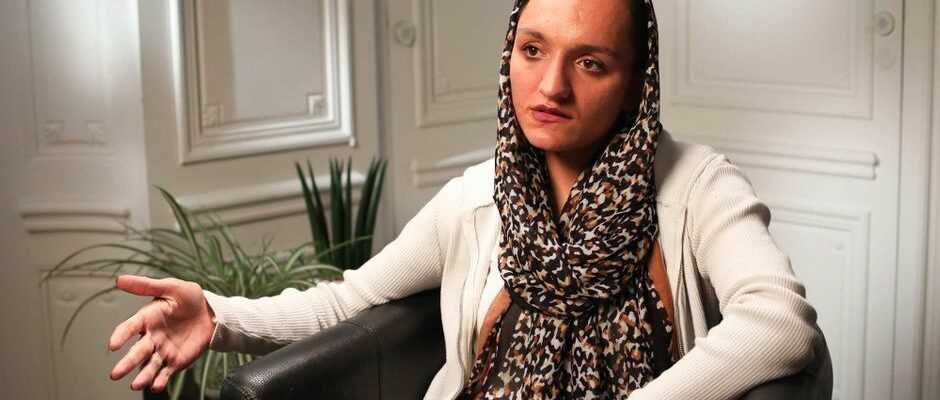Zarifa Ghafari is not yet 30 years old but was elected, in November 2019, the youngest mayor of Afghanistan. An election which earned him to be the victim of assassination attempts and to see his father assassinated, in November 2020. Forced to flee the country when the Taliban took power last summer, the mayor of Maidan Shar, awarded in 2020 by the US Secretary of State and Melania Trump with the “Women of Courage” prize, wants to remain optimistic and has only one dream: to be able to return to live in Afghanistan.
Paris Match. Nominated for the Sakharov Prize last year, you have just taken part in the “Afghan Women’s Days” at the European Parliament. A crucial job for you?
Zarifa Ghafari. Talking about Afghan women, these women that I know, that I represent, of whom I think I know what they want, it is a privilege because I speak on behalf of these women who work, speak but do not have the platform to be heard widely. It’s great to be where your opinion matters and is heard, where you can have an impact on those who make decisions.
Reporting :Afghanistan no longer wants to see its women
You left Afghanistan last summer. Did you think you had to run away one day?
Not really. I struggled with the idea of leaving Afghanistan until boarding the plane. On July 22, I was in Dubai and I returned to Afghanistan when I had to go to an international summit in Germany. I applied for a visa which I couldn’t get quickly, I decided I couldn’t be away too long so I went back. When I returned, my mother, my sisters, my colleagues, everyone was shocked: no one expected me to come back to face the situation. I never really wanted to leave and I didn’t leave for myself: I’m not afraid of death, I’ve always believed that we were born to die one day. Being born and dying for a cause is important. I made the decision to leave Afghanistan to protect my family, the rights of my three sisters. I lost my father, murdered because of me, my voice, my decisions, my involvement in society. I didn’t want the rest of my family to pay the same price because of my ambitions. It was important to give them the chance to live their life, especially for my sisters. But I can’t imagine staying permanently outside Afghanistan, I can’t do it. This is a goal for me in the near or distant future: to return to my country, where my father is buried.
Interview: Sima Samar: “The most powerful tool to fight against ignorance is education”
“This departure was more difficult than the death of my father”
You left Afghanistan thanks to German diplomacy, with your relatives.
I fled with all my family and my fiancé. At the very last moment, when boarding, I asked my mother if she would agree to leave right away and that I wouldn’t join her until after… She burst into tears, saying to me: “I’ve already lost my husband, I can’t lose anyone else. It was a very hard moment. But it was the responsible decision for those I care about. This departure was more difficult than the death of my father.
Do you maintain the link with your constituents?
Yes, and not just in my city of Maidan Shar, but across the country. I am in contact with them, I closely monitor the situation in Afghanistan.
You have grown with the international presence in Afghanistan. Could you have imagined the return of the Taliban to power?
When I was a kid, until my twenties, I thought the world was the way I wanted to see it. But when I learned what he really was, I realized that if the Taliban had fled the country in a week in 2001, they could very well be back in a week. The return of the Taliban to power began years ago, it was not recent. It accelerated with the signing of the Doha agreement with the Americans. It wasn’t sudden, improvised. We tried to do the maximum at our level to change things, but I’m sorry for not having succeeded, for not having succeeded in getting to the root of the problem. I have a lot of regrets, but I’m happy, comforted to have at least tried.
“The first time, nobody cared about us or the Taliban”
How can the international community help?
We must put pressure on the Taliban to obtain guarantees on human rights, on the rights of women. There are many ways to do it, money and various aids. I hope that humanitarian aid can reach all parts of the country, including and especially women. We must not only focus on the distribution of aid but we must also go there, meet the people, ask what projects they would like to build. And above all, we must finance small projects at the root of society, those that can directly help people.
Do you see any differences with the first Taliban regime?
The only difference in my eyes is that the first time, nobody cared about us or the Taliban. Now we are being listened to. I am convinced that this can help: if we listen, we can feel, act, decide. I hope the international community will.
Can you stay optimistic?
We Afghans specialize in keeping hope alive: it’s the only resource we have. Without it, we have nothing. This hope comes from knowing that this is not the Afghanistan of 20 years ago, there is now a new generation. 20 years ago, I was a child. Now I can represent my country, at least the women’s movement.
Any reproduction prohibited
